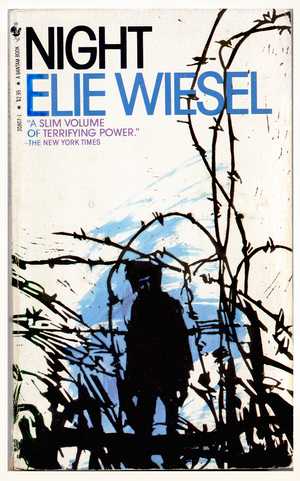Elie Wiesel reveals life in Auschwitz in his novel, Night

Cover of Night
February 25, 2019
When first thinking of a school book, dread sets in about having to analyze a “boring” book. More times than not, that “boring” book is interesting and hard to put down. An example of this is a nonfiction book titled Night by Holocaust survivor Elie Wiesel. From start to finish, this book draws people in and they have to keep reading.
Elie Wiesel, a Jewish man, recounts his experience from Jewish Ghettos to the Concentration Camps. He begins in a Ghetto with all of his family and the people in the surrounding area. At this point, everyone still has hope that the horrors others account are not true. Wiesel and many others in the area are deported by cattle car to a Concentration Camp. His family then goes through many different selection processes and he describes the events that he experiences thought his time at the camp. He details what humans can do in times of absolute distress and psychological breaking of human beings.
At one point in the book, Wiesel explains what lengths people will go to save themselves. A young man kills his father for a single piece of bread. The guards throw the bread in just to see them fight over it and the young man is so desperate that he kills his own father to get something to eat. Another instance is when mothers, knowing that they will die, refuse to leave their children and infants. These two examples show the good and bad of human nature when faced with stressful situations.
Although it took Wiesel 10 years to even talk about his time during the Holocaust, he tells all in this book. Sometimes you must remind yourself that this is a nonfiction book and these things actually happened. Wiesel wrote many other books including Dawn and Day in the Night trilogy and Souls on Fire. Even if nonfiction is not a favorite, reading this will change your mind.

